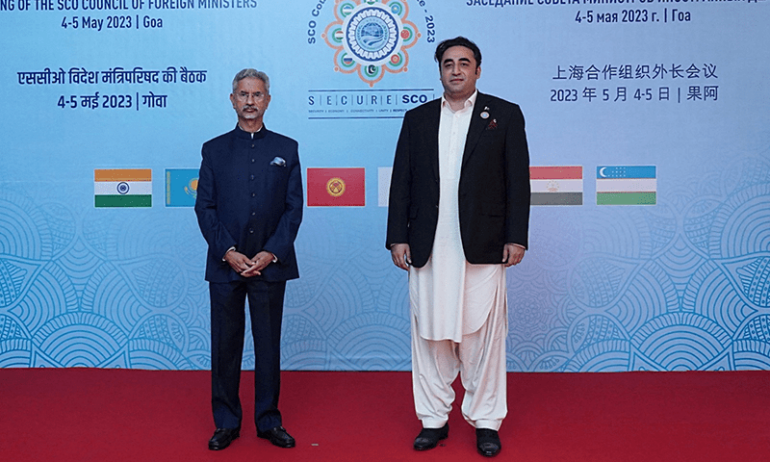Foreign Minister Bilawal Bhutto Zardari on Friday said that India’s actions on August 4, 2019 for revoking special status of Jammu and Kashmir had “really undermined the environment” and that the onus was now on India to create a conducive environment for talks to be held between the two countries.
The Foreign Minister emphasized that it was Pakistan’s “principled position” that the status quo of August 4, 2019 is withdrawn as this was necessary in order for constructive dialogue to take place between the two nations.
He passed these remarks on the second day of his visit to Goa, where he attended the Shanghai Cooperation Organisation’s (SCO) Council of Foreign Ministers (CFM) meeting.
The Foreign Minister’s remarks come amidst heightened tensions between the two countries, particularly in light of recent clashes in the disputed region of Kashmir.
Bilawal Bhutto Zardari, the chairman of Pakistan People’s Party (PPP) said his party had always supported normalization of relations with India.
However, he emphasized that India’s “unilateral and illegal” actions regarding the disputed region of Kashmir on August 5, 2019, had violated international law, United Nations resolutions, and bilateral agreements.
Bilawal expressed concerns over the “trust deficit” that had developed due to India’s violation of previous agreements.
He added that there can be no change in the policy on diplomatic relations with India until it reverts to the status quo of August 4, 2019, with regards to Kashmir.
In response to a question on India’s decision to host G20 meetings in occupied Kashmir, he said: “Obviously we condemn it and at the time we will give such a response that it will be remembered.”
Pakistan’s Foreign Minister, Bilawal Bhutto Zardari, criticized India for holding meetings in the disputed territory of Kashmir, calling it a display of “pettiness” and “arrogance.”
He stated that by conducting events in Kashmir, India was demonstrating its disregard for international law, United Nations Security Council resolutions, and bilateral agreements. Bilawal further warned that India’s attempts to garner “110 per cent attendance” at such events would fail as others would not compromise on their morals.
Bilawal Bhutto Zardari expressed his disappointment over India’s refusal to visit Pakistan for the Asia Cup 2023 and its demand for a neutral venue due to ongoing tensions between the two countries.
He emphasized that sports should not be held hostage to politics and foreign policy. it would be “very petty” of India to hold sports hostage to politics and urged that sportsmen and cricket should not suffer due to bilateral issues.
In response to a question on the World Cup 2023, Bilawal expressed hope that Pakistan would not have to withdraw its players from the tournament due to bilateral tensions.
At the same time, the foreign minister also said that the two countries could not be held hostage by history.
“In our heart of hearts, most Pakistanis … and most Indians … want us to live in peace and peace is our destiny,” he said. “God willing, what could not happen in the past, our generation will not be held by history but we will create our own history.”
The foreign minister said that India and its media’s interest in his visit to Goa reflected an interest in Pakistan, reiterating that both nations desired peace, improvement in ties and mutual progress in the subcontinent.
The foreign minister hoped that when Pakistan chairs the SCO in 2026, India would take a good step to participate in the summit on the basis of “reciprocal diplomatic agreements”.
I believe the Indian foreign minister would be met with an equivalent amount of interest from the Pakistani media and people, he added.
Talking about his interactions with Indian Minister of External Affairs Subrahmanyam Jaishankar, FM Bilawal said that it was “no problem for me on camera” and that his Indian counterpart should be asked if he had any issues.
He said the way they met was similar to how people greeted each other in Sindh and Multan so “it was a moment of happiness for me that we were greeting each other the same way”.
Acknowledging the dilemma of his Indian counterpart, Bilawal said Jaishankar was “damned if he does and damned if he doesn’t” in regards to cordially greeting him.
“He greeted everyone the same way and there was no distinction in how Pakistan and how others were treated so I don’t think it is merited for us to complain.
“Whenever we meet, for dinner or anything, there are handshakes and pleasantries exchanged. We are civil, not uncivilised and fighting doesn’t start immediately as soon as we spot each other. When we are working in our professional capacity he has to present his country’s stance and I mine.”
He said that if — in the course of those professional obligations — they had a back-and-forth, it was not due to any personal issues but simply them doing their jobs.
“As for our talks with each other and dinner, I wouldn’t read too much into it,” the minister added.



